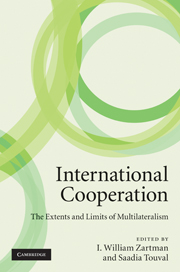Book contents
- Frontmatter
- Contents
- List of figures
- List of tables
- List of contributors
- Acknowledgements
- 1 Introduction: return to the theories of cooperation
- Part 1 Multilateral meanings of cooperation
- 2 Debating cooperation in Europe from Grotius to Adam Smith
- 3 The two sides of multilateral cooperation
- 4 Deconstructing multilateral cooperation
- 5 Negotiated cooperation and its alternatives
- Part 2 Multiple strategies of cooperation
- Bibliography
- Index
2 - Debating cooperation in Europe from Grotius to Adam Smith
Published online by Cambridge University Press: 05 June 2012
- Frontmatter
- Contents
- List of figures
- List of tables
- List of contributors
- Acknowledgements
- 1 Introduction: return to the theories of cooperation
- Part 1 Multilateral meanings of cooperation
- 2 Debating cooperation in Europe from Grotius to Adam Smith
- 3 The two sides of multilateral cooperation
- 4 Deconstructing multilateral cooperation
- 5 Negotiated cooperation and its alternatives
- Part 2 Multiple strategies of cooperation
- Bibliography
- Index
Summary
Following the irrevocable success of the Reformation in northern Europe, a new, secular theory on war and interstate relations was needed at the dawn of the seventeenth century. In many ways, it was the Peace of Westphalia (1648) that ushered in what Carl Schmitt (1950) termed the Jus Publicum Europaeum. The treaties introduced a secular notion of relations between states and reinvigorated the law of nations (jus gentium). They also enshrined the principle of state sovereignty, which had been gradually gaining force since the fourteenth century (Skinner 1978). The law of war, treaties and embassies was all part of the practical and theoretical response to new political challenges. Diplomacy was shaped by the growing need for enduring relations among states. The “balance of power” idea was built as a counterweight to state sovereignty, to rein in the dangers inherent in universal monarchy.
The nature of international society since 1648 has been the subject of an extensive literature. However, international relations theorists have often strayed on a number of key issues. First, their use of terms such as “Westphalian system”, “Grotian tradition,” and “society of states” is based on a narrow interpretation of thinking on the advent of an international political and legal order. In many ways, their interpretation is ahistorical. Hugo Grotius is thus more renowned for having advocated the existence of an international society than actually analysing its make-up and elucidating how it works. As explained by Edward Keene,
[O]ver the last thirty years or so, the historical analysis of Grotianism by theorists of international relations has moved away from debates about the sources, content and scope of international law within a societas gentium, and has instead concentrated on debates about the nature of international politics within a states-system. […]
- Type
- Chapter
- Information
- International CooperationThe Extents and Limits of Multilateralism, pp. 15 - 39Publisher: Cambridge University PressPrint publication year: 2010



